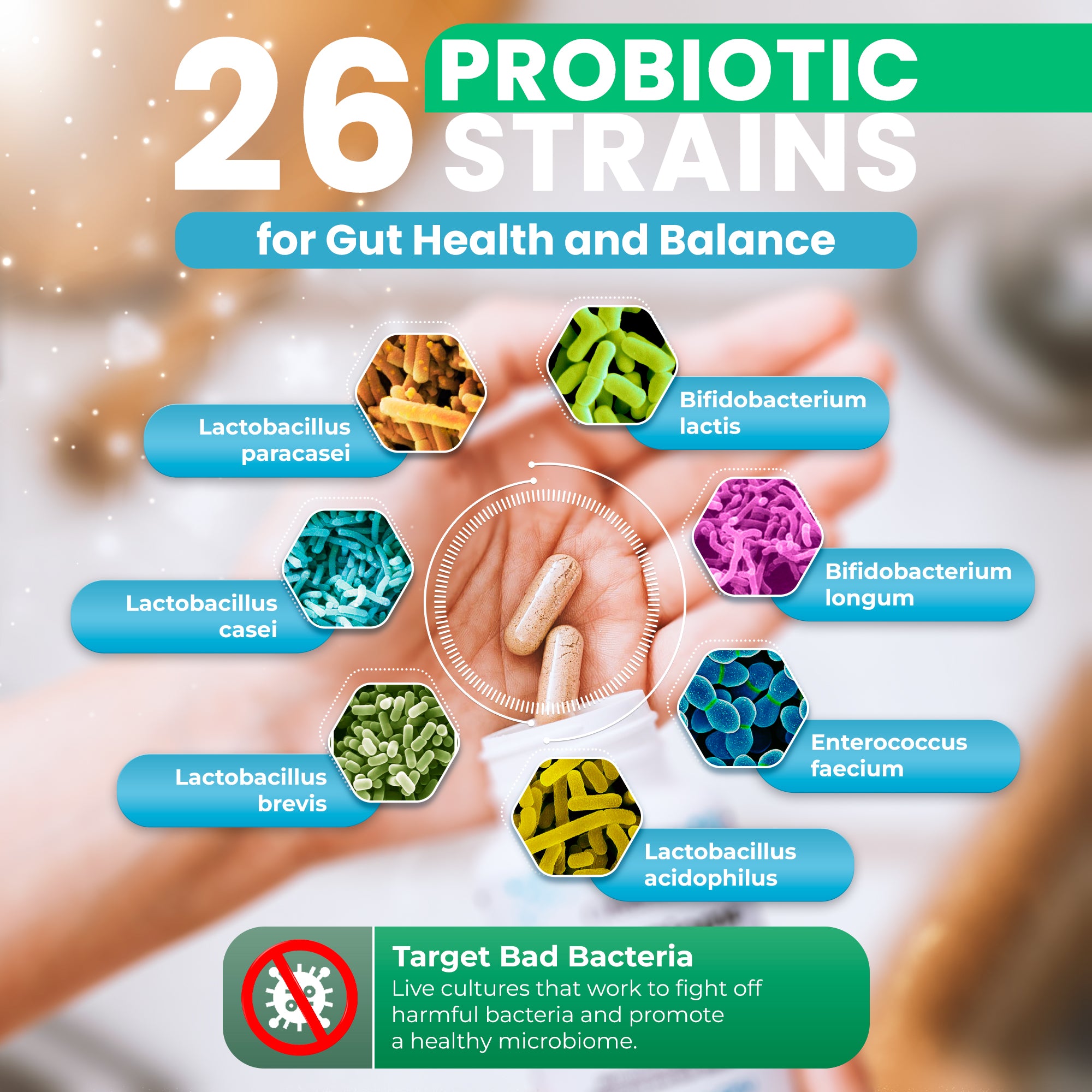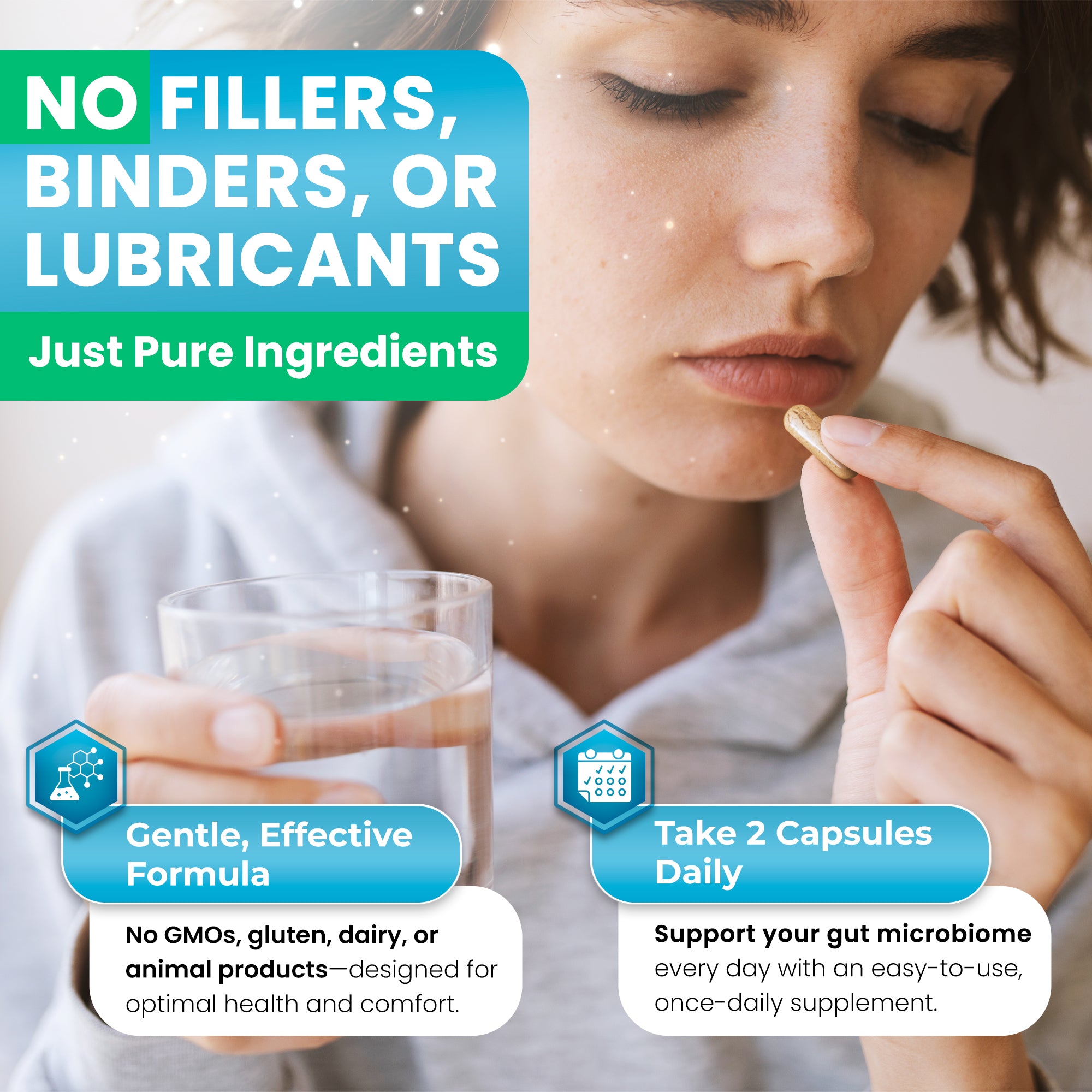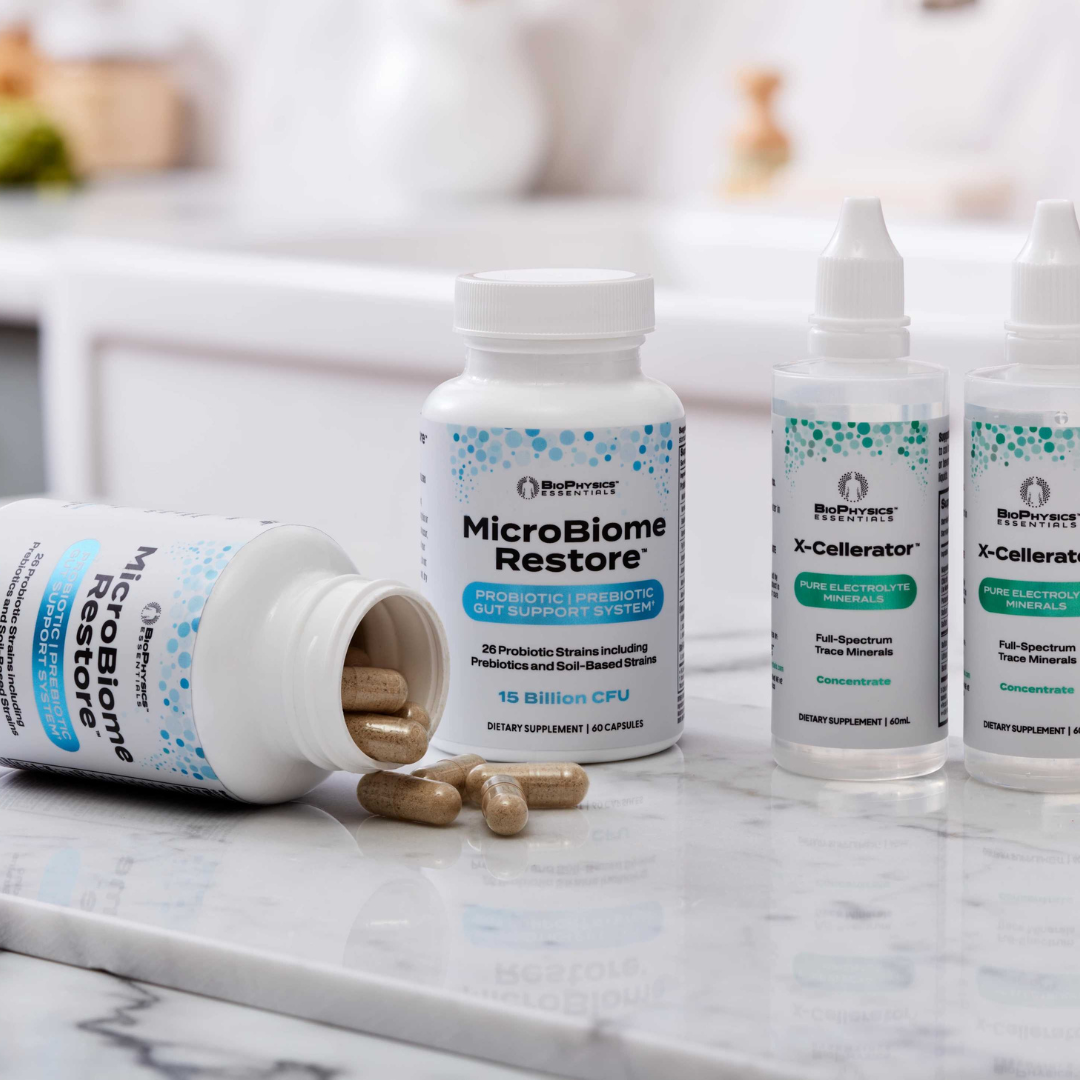Gut health is important for our overall well-being. The balance of bacteria in our digestive system plays a big role in how we feel. While probiotics get a lot of attention, prebiotics can make them work even better. Let's look at seven powerful prebiotics that can improve your gut health. These natural compounds feed good bacteria and help with digestion, nutrient absorption, and immune function.
Key Points: Prebiotics for Gut Health
- Prebiotics feed beneficial gut bacteria, enhancing probiotic effectiveness
- Maitake Mushroom and Fig Fruit offer potent prebiotic benefits
- Jerusalem Artichoke is rich in inulin, a powerful prebiotic fiber
- Acacia senegal gum supports digestive health and beneficial bacteria growth
- Seaweeds like Norwegian Kelp, Bladderwrack, and Oarweed contain unique prebiotic compounds
- Combining specific prebiotics with probiotics improves overall gut health
- Regular use of prebiotics optimizes digestive function and immune support
1. Maitake Mushroom: The Immune-Boosting Prebiotic Powerhouse
Maitake mushrooms, also known as Grifola frondosa, are more than just tasty. They contain beta-glucans, a fiber that acts as a prebiotic. Beta-glucans feed good gut bacteria and support immune function. Studies show Maitake mushrooms can boost natural killer cells and improve the activity of macrophages, helping your body fight off harmful microorganisms.

Benefits of Maitake Mushrooms:
- Supports immune system function by enhancing natural killer cell activity
- Enhances growth of beneficial gut bacteria, promoting a balanced microbiome
- Rich in antioxidants, helping to combat oxidative stress in the body
- May help regulate blood sugar levels and support cardiovascular health
How to use: Add dried Maitake to soups and stews, or use Maitake powder in smoothies or tea. Start with small amounts, like 1-2 grams per day, and slowly increase. For best results, use Maitake 3-4 times a week. Choose high-quality, organic Maitake mushrooms or supplements.
2. Fig Fruit: Nature's Sweet Prebiotic Treat
Figs are tasty and full of prebiotic fiber. They have both soluble and insoluble fiber, which is great for gut health. Fig fiber slows digestion, makes you feel full, and feeds good gut bacteria. Figs also have compounds called arabinogalactans, which can help grow beneficial Bifidobacteria in your gut.
Benefits of Fig Fruit:
- High in both soluble and insoluble fiber, promoting digestive health and regularity
- Promotes regular bowel movements and may help alleviate constipation
- Supports healthy blood sugar levels due to their low glycemic index
- Rich in antioxidants and essential minerals like potassium and calcium
- May help reduce inflammation in the gut and throughout the body
How to use: Eat fresh or dried figs as a snack, or add chopped figs to yogurt, oatmeal, or salads. Aim for 2-3 figs per serving, 2-3 times a week. You can soak dried figs overnight to make them softer. Remember figs are high in natural sugars, so eat them in moderation. Try pairing figs with protein or healthy fats to balance blood sugar.
3. Jerusalem Artichoke: The Inulin Powerhouse
Jerusalem artichokes, also called sunchokes, are rich in inulin, a prebiotic fiber that's great for growing good gut bacteria. Inulin supports digestive health and helps your body absorb minerals better. It passes through your digestive system mostly undigested until it reaches your colon, where good bacteria feast on it. When gut bacteria ferment inulin, they produce short-chain fatty acids, which are good for your gut lining and can reduce inflammation.
Benefits of Jerusalem Artichokes:
- High in inulin fiber, promoting the growth of beneficial gut bacteria
- Supports healthy blood sugar levels by improving insulin sensitivity
- Promotes mineral absorption, particularly calcium and magnesium
- May help reduce appetite and support weight management
- Contains thiamine and potassium, supporting heart and nervous system health
How to use: Roast Jerusalem artichokes as a side dish, or add raw, sliced sunchokes to salads. Start with small portions, like 1/4 cup cooked, and slowly increase to 1/2 cup servings 2-3 times a week. Cook them well to reduce digestive discomfort. If you're new to high-inulin foods, start slow to let your gut adjust.
4. Acacia (Acacia senegal): The Gentle Gut Soother
Acacia senegal, also known as gum arabic, is a soluble fiber that acts as a prebiotic. It's gentle on your digestive system, making it good for people with sensitive stomachs. Acacia fiber ferments slowly in your gut, providing steady food for good bacteria. This slow fermentation also means it's less likely to cause bloating or gas compared to other prebiotic fibers. Studies show acacia fiber can increase the production of short-chain fatty acids in your gut, which are important for keeping your gut lining healthy and reducing inflammation.
Benefits of Acacia:
- Gentle on the digestive system, making it suitable for those with sensitive stomachs
- Supports healthy blood sugar levels by slowing glucose absorption
- May help reduce inflammation in the gut and improve overall gut barrier function
- Can support weight management by promoting feelings of fullness
- May help lower cholesterol levels and support heart health
How to use: Use acacia fiber powder in smoothies or drinks, starting with 1 teaspoon per day and slowly increasing to 1 tablespoon. Drink plenty of water with it to prevent constipation. Consider taking acacia fiber before meals to help manage appetite and blood sugar. Talk to a doctor before adding acacia to your diet, especially if you have digestive issues or take medication.
5. Norwegian Kelp (Ascophyllum nodosum): The Mineral-Rich Prebiotic
Norwegian kelp is a seaweed that offers prebiotic fibers and essential minerals. It's high in fucoidan, a complex sugar that helps good gut bacteria grow and may have anti-inflammatory and immune-boosting properties. Norwegian kelp is also a rich source of iodine and other trace minerals, making it good for your gut and overall health.

Benefits of Norwegian Kelp:
- Rich in fucoidan, a prebiotic polysaccharide with potential anti-inflammatory properties
- Excellent source of iodine and trace minerals, supporting thyroid function and overall metabolism
- Supports thyroid health and may help regulate hormone production
- Contains antioxidants that may help protect against oxidative stress
- May support weight management by boosting metabolism and reducing fat absorption
How to use: Use kelp powder in smoothies or soups, starting with 1/4 teaspoon and slowly increasing to 1 teaspoon daily. Try kelp noodles in salads or stir-fries as a low-carb pasta alternative. Start with small amounts to see how your body reacts. Be careful with the iodine content and talk to a doctor if you have thyroid issues or take medications. It's best to eat kelp 2-3 times a week to avoid getting too much iodine.
6. Bladderwrack (Fucus vesiculosus): The Thyroid-Supporting Prebiotic
Bladderwrack is another seaweed that's good for your gut and has lots of iodine. Its prebiotic fibers feed good gut bacteria, while the iodine helps your thyroid work well. This makes it good for both gut and hormone health. Bladderwrack also has fucoxanthin, which might help reduce inflammation and act as an antioxidant. All these nutrients make bladderwrack great for gut health, especially if you want to support your thyroid naturally.
Benefits of Bladderwrack:
- Contains prebiotic fibers that support the growth of beneficial gut bacteria
- High in iodine for thyroid support and regulation of metabolic processes
- May help support healthy weight management by boosting metabolism
- Contains fucoxanthin, which may have anti-inflammatory and antioxidant effects
- Rich in minerals like potassium, calcium, and magnesium, supporting overall health
How to use: Look for bladderwrack supplements or use bladderwrack powder in smoothies or teas. Start with a small amount, like 100-200 mg per day, and slowly increase as your body gets used to it. Use it carefully and talk to a doctor, especially if you have thyroid problems or take medications. It's best to use bladderwrack supplements in cycles, like 3 weeks on and 1 week off, to avoid getting too much iodine. Always choose high-quality supplements that have been tested for purity and the right amount of iodine.
7. Oarweed (Laminaria digitata): The Gut-Soothing Seaweed
Oarweed, also called kombu, is a brown seaweed rich in alginates, a type of prebiotic fiber that's good for your gut. These alginates feed good bacteria and may help form a protective layer in your gut, which could reduce inflammation and support digestive health. Oarweed also has fucoidan, like Norwegian kelp, which might help boost your immune system and reduce inflammation. It's also full of vitamins and minerals like iodine, iron, and calcium, making it great for your gut and overall health.
Benefits of Oarweed:
- Rich in prebiotic alginates that nourish beneficial gut bacteria
- May help soothe digestive discomfort and reduce gut inflammation
- Supports a healthy gut barrier, potentially improving nutrient absorption
- Contains fucoidan, which may have immune-modulating properties
- Good source of essential minerals, including iodine, iron, and calcium
How to use: Use dried oarweed in soups and broths, or look for oarweed supplements or powders. When using dried oarweed, start with small pieces (about 1-2 inches) in soups or stews, cooking for at least 20 minutes to soften. For powdered supplements, begin with 1/4 teaspoon daily and slowly increase to 1 teaspoon as your body adjusts. Like other seaweeds, be careful with the iodine content and talk to a doctor if you have thyroid concerns. It's best to add oarweed to your diet slowly and see how your body reacts.
Enhancing Probiotic Efficacy with Prebiotics
Prebiotics and probiotics work together to improve gut health. Prebiotics feed probiotics, helping these good bacteria grow in your gut. This teamwork, called "synbiotics," can be more helpful than using either one alone. By mixing different prebiotics with various probiotic strains, you can create the best environment for gut health and overall wellness.
While eating prebiotic foods is good, it can be hard to get the right mix and amount of prebiotics and probiotics from food alone. This is where supplements like MicroBiome Restore™ can help. A good supplement can give you a steady and concentrated source of both prebiotics and probiotics, making sure your gut gets the daily support it needs.
MicroBiome Restore™ is a carefully made supplement that combines prebiotics and probiotics to support optimal gut health. Here's why it's special:
- 26 live probiotic strains: A wide range of good bacteria to support gut health, including types from the Lactobacillus and Bifidobacterium families, known for helping digestion and immune health.
- 9 certified organic prebiotics: Including some of the powerful prebiotics we've talked about, like Jerusalem artichoke inulin and acacia fiber, giving a full range of prebiotic support.
- No fillers or artificial additives: Pure, clean formula for best results, giving you only the active ingredients your gut needs.
- Shelf-stable: No need for refrigeration, making it easy to use daily and when traveling. The probiotic strains are protected by advanced manufacturing processes.
- Scientifically formulated: The mix of prebiotics and probiotics is based on current research in microbiome science, aiming to provide complete support for gut health.
Conclusion: Nourishing Your Gut for Better Health
Adding various prebiotics to your diet, along with a good probiotic supplement like MicroBiome Restore™, can greatly improve your gut health and overall wellness. By feeding your good gut bacteria with these powerful prebiotics, you're not just helping your digestion, but also boosting your immune system, improving how your body absorbs nutrients, and possibly enhancing your mood and energy levels. The different prebiotics we've discussed - from Maitake mushrooms to seaweeds like Oarweed - offer many options to fit different diets and needs.
Remember, consistency is key for gut health. Make these prebiotic-rich foods a regular part of your diet, and think about using MicroBiome Restore™ to give your gut the full support it needs. Your gut bacteria will thrive, and you'll likely notice improvements in many aspects of your health. It's important to look at gut health as a whole, considering not just supplements but also what you eat, how you live, and how you manage stress for the best results.
For those wanting to improve their gut health even more, check out our Gut Essentials Protocol. This complete approach combines MicroBiome Restore™ with our X-Cellerator™ Full Spectrum Trace Minerals for a full approach to digestive health and overall wellness. The Gut Essentials Protocol is designed to provide a mix of probiotics, prebiotics, and essential minerals, addressing many aspects of gut and overall health at the same time.
Start improving your gut health today with BioPhysics Essentials. Your gut—and your whole body—will thank you. Remember, while supplements can be a powerful tool for your health, they work best as part of a balanced lifestyle that includes eating a variety of foods, exercising regularly, getting enough sleep, and managing stress. Talk to a healthcare professional to create a personalized gut health plan that fits your individual needs and health goals.












Share and get 15% off!
Simply share this product on one of the following social networks and you will unlock 15% off!